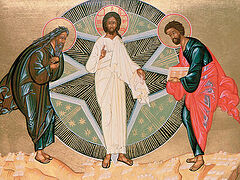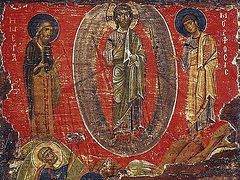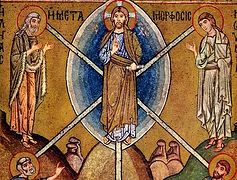“And it came to pass about an eight days after these sayings, he took Peter and John and James, and went up into a mountain to pray. And as he prayed, the fashion of his countenance was altered, and his raiment was white and glistering” (Luke 9:28-29).
Long before the creation of the universe in time, in the pre-eternal Divine Counsel, the fall of man into sin was foreseen. And so together with the created world and man it was decided that mankind would be saved through the Redeeming Intercession of the Man-God. When the fullness of time was reached, the Son of God indeed became Incarnate and suffered for humankind. But in order that these sufferings were not only manifested, but properly received, first by the disciples and then by all of mankind, the Savior, during His earthly life, gradually prepared His chosen disciples, and through them all of humanity, for the proper understanding of these sufferings. For this he often prayed for His sufferings to His Heavenly Father and frequently discussed them with His disciples. For this He ascended Mount Tabor. He did so to pray, and during prayer, to reveal to His disciples His glory, so that when they would later see Him crucified, they would realize that His sufferings were willful, that He Himself, though He suffered for mankind, had still by His Divine nature the brilliance of the Father.
See how powerful and effective was His prayer!
He prayed about His sufferings, and during His prayer, mankind beheld the glory of His Divinity. And this is the natural result of that prayer. The spirit of prayer, uniting with the Spirit of God, filled the soul of Jesus. The overabundance of this light was not contained only in His Soul but poured forth into His body, and shined in His visage. Unconstrained even there, the light shone upon and transfigured His garments. Spreading yet further, it embraced the souls of the apostles, which was proclaimed by Peter: “Lord, it is good for us to be here” (Matthew 17:4). The unseen world was revealed, drawing out Moses and Elias, reaching the very bosom of the Father of Heaven and showed His love in the grand witness of His Beloved: This is my beloved Son (Matthew 17:5).
O miraculous prayer, unifying Heaven and earth and even Divinity Itself! A truly grand example, my brethren, was revealed to us the prayer of the God-Man, an example which beckons to us that we follow this example and make it a constant rule in our lives. May no one of you think that this does not apply to us, this work of the God-Man. It does apply to us. For in us, though not to the same degree, but still must happen what happened in Christ. Let this mind be in you, which was also in Christ Jesus (Philippians 2:5).
The Savior God-Man had need of prayer: do you, human being, have no need of it? If you examine yourselves as creatures, as creations of God, what significance do you have apart from God’s creation and preservation? None. Just as your insignificance has no right to existence, so your existence has no right to blessedness. Only by the grace of God do you exist, and only by the mercy of God can you be blessed. But this is not enough. You are not only a son of Adam the first-created. You are a son of Adam the fallen, and for this are condemned by Divine Justice. You are one of his descendants, all are born in sin, according to the words of Righteous Job: Who can bring a clean thing out of an unclean. Not one. Seeing his days are determined (Job 14:4-5). And so you have need not of blessings of God as His creation, but His mercy as His sinful creature.
“I know this,” you would say, “but I cannot force myself to pray, since I do not possess the proper mood.” This is true, man, but from this truth you make a false conclusion. Truly there is in human nature a strange duality and a conflict of intentions. On one hand, the sense for a need in the Divine and the desire to commune with God. And on the other, some mysterious reluctance to ponder the Divine and an inclination to flee communion with Him. It is not difficult to see why. The first sense belongs to our original nature, and the second belongs to our nature damaged by sin. This is the continuation until now of that direction which was spoken of our ancestors after their first violation of the commandment of God. “And they heard the voice of the Lord God walking in the garden in the cool of the day: and Adam and his wife hid themselves from the presence of the Lord God amongst the trees of the garden” (Genesis 3:8). If you, like your ancestors, wish to flee the Lord, then go. But know that for this escape from the Lord you will be driven out by the Fiery Angel from the palace of Heavenly bliss. If you wish to share the Lord’s joy, do not flee Him, but rush towards Him, suppressing within yourself your sinful rejection of Him.
“I do pray,” you might say, “but my prayer is without effect and fruitless.” Truly, our prayers can be like this, but not be its essence but by our feebleness. Your prayer may be without effect and without fruit because you do not pray for what you should, or you do not pray the way you should. “Be wise in your prayers,” says St Isaac of Syria, “ask not of any material or useless thing, remember the words of the Savior: But seek ye first the kingdom of God, and his righteousness; and all these things shall be added unto you.” (Matthew 6:33). And if you wish to pray for the temporal, ask for what you think is needed and beneficial. But the fulfillment or not of your request leave to the Will of God in faith and hope in the Almighty, the wisdom and grace of God. This supreme form of prayer was granted to you be Him Who prayed in the Garden of Gethsemane, that the cup passeth from Him. Nevertheless not my will, but thine, be done (Luke 22:42).
St John of the Ladder wrote: “Do not be over-sophisticated in the words you use when praying, because the simple and unadorned lisping of children has often won the heart of their heavenly Father. Do not attempt to talk much when you pray lest your mind be distracted in searching for words. One word of the publican propitiated God, and one cry of faith saved the thief. Loquacity in prayer often distracts the mind and leads to phantasy, whereas brevity makes for concentration. Do not be bold, even though you may have attained purity; but rather approach with great humility, and you will receive still more boldness. Though you may have climbed the whole ladder of the virtues, pray for forgiveness of sins.
Pray with faith, for faith gives prayer wings, and without faith prayer will not soar to heaven. Finally, seeing no result from long prayers, do not say: ‘I obtained nothing.’ For the very time spent in prayer is already a prize; and what good is higher than to adhere to the Lord and be ever united with Him?” (The Ladder, Step 28).
If you pray, the Lord will not reject you. Pray first as you can, with incomplete prayer, and the Lord will grant you ideal prayer. And the latter will not only take you to Mount Tabor, but to Heaven itself! Amen.




